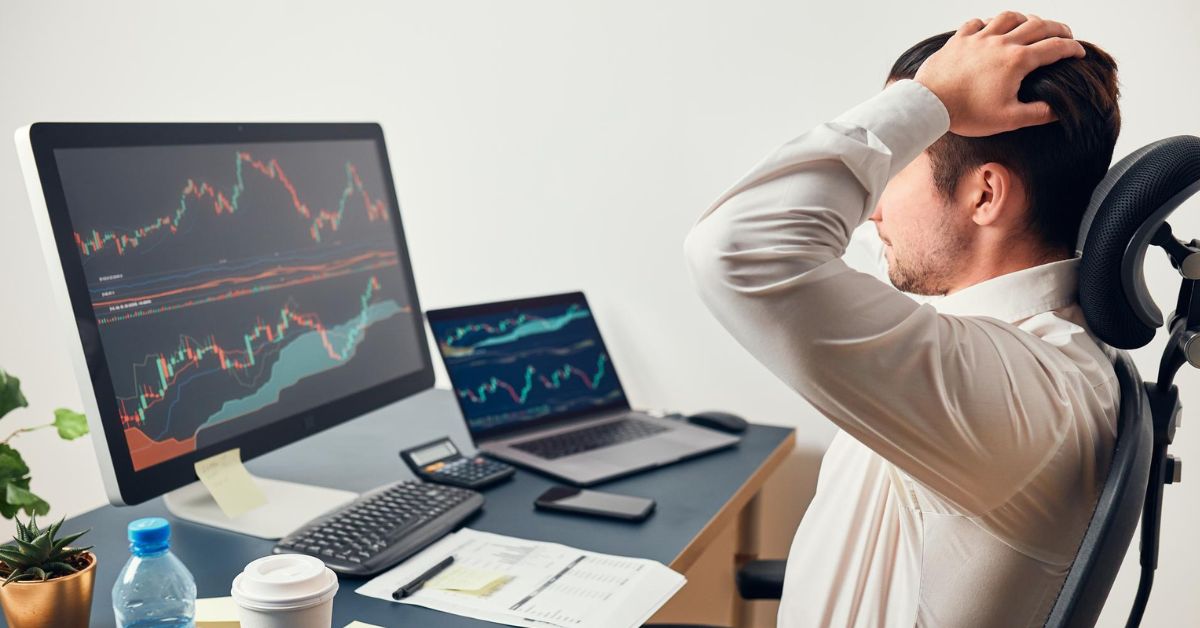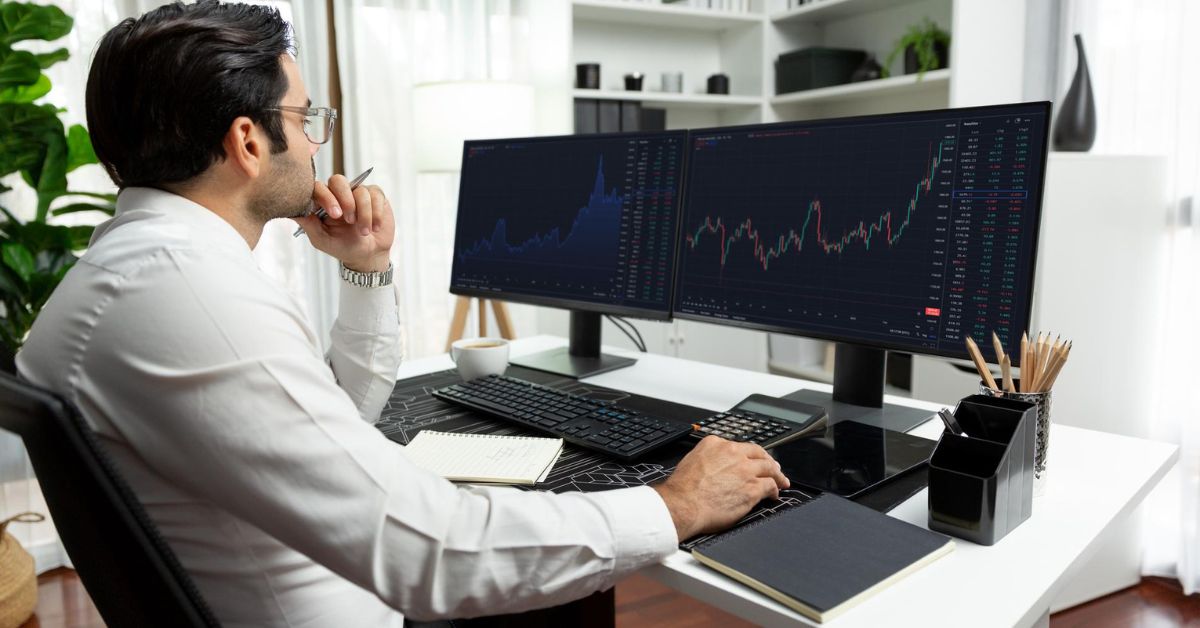It is thrilling to trade in financial markets, but anxiety-prone individuals may find it challenging as well. Stress can affect trading performance and well-being when traders face pressure to make quick decisions, manage risks, and achieve financial goals. Novice and experienced traders must understand the connection between trading and anxiety.
Finding a reliable trading platform like Prime XBT can provide a sense of security for many traders. The user-friendly interface and robust features of Prime XBT make it easy for traders to make informed decisions while minimizing uncertainties. So, join PrimeXBT today! Use promo code PRIMEOTT to receive a +7% bonus on your deposit.
Despite a solid platform, psychological challenges can persist, making it crucial to explore anxiety management strategies. In this article, we’ll explore trading anxiety, identify its triggers, and provide practical strategies to help you maintain your composure and improve your trading. Managing anxiety will help you make better decisions and trade more effectively.
What is Anxiety?

Anxiety is a natural response to stress and uncertainty. It manifests as a feeling of worry or fear about the future. In trading, anxiety can stem from various factors, including market volatility and financial pressure. Managing anxiety effectively requires recognizing its symptoms.
Common symptoms of anxiety include restlessness, rapid heartbeat, and difficulty concentrating. Traders may experience physical sensations, such as sweating or trembling. These symptoms can significantly affect decision-making and performance in trading environments.
Different types of anxiety can impact traders differently. Performance anxiety focuses specifically on trading outcomes, while generalized anxiety affects overall well-being. These distinctions can help traders identify their unique challenges and develop tailored coping strategies.
The Connection Between Trading and Anxiety
Trading is inherently linked to high levels of stress and uncertainty. Financial markets are volatile and can change rapidly, often in seconds. This volatility creates intense pressure on traders to make quick and accurate decisions.
Such pressure frequently leads to heightened feelings of anxiety among traders. Fear of losses is a significant contributor to trading anxiety. Many traders worry about the financial repercussions of losing money in the market. This fear can cloud judgment and lead to impulsive or irrational decisions during trades.
Psychologically, potential losses can take a heavy burden on mental and emotional health. The high stakes involved in trading exacerbate anxiety levels. Traders often invest substantial amounts of money, increasing the pressure to achieve positive results.
The fear of losing hard-earned money can create a paralyzing sense of dread. This anxiety can lead to a vicious cycle where heightened stress results in poor performance, which makes anxiety worse. It’s crucial to understand this connection to develop effective coping mechanisms.
Identifying Triggers of Anxiety in Trading
It is crucial to identify the specific triggers of trading anxiety to manage it effectively. These triggers can have a significant impact on a trader’s mental state and ability to make decisions. Traders need to know what causes anxiety so they can develop effective coping strategies.
Market Volatility
Market volatility is a primary trigger for anxiety among traders. Suddenly, fluctuating prices can create panic and uncertainty, making rational decisions difficult. For example, a sharp drop in stock prices can lead to immediate feelings of dread.
Economic news releases are also significant triggers, primarily when results differ from expectations. A major announcement, like an interest rate change or employment figures, can cause panic in the stock market.
Personal Triggers
Personal triggers can stem from individual experiences and past performance. Traders who have suffered significant losses in the past may develop increased anxiety when approaching similar assets.
This fear of repeating past mistakes can inhibit their ability to trade confidently. Additionally, overtrading, or making excessive trades without proper analysis, can create anxiety. This behavior often leads to regret and increased stress levels.
Physical and Emotional Triggers
Recognizing physical and emotional signs of anxiety is also vital for traders. Physical symptoms can include increased heart rate, shallow breathing, and excessive sweating. These symptoms may occur during critical trading moments.
You may feel fearful, irritable, or restless, which can affect your focus and decision-making. Identifying these triggers can help traders manage their anxiety levels and improve their trading.
Strategies to Manage Anxiety in Trading

Managing anxiety in trading is crucial for improving overall performance. Traders can maintain their composure during stressful times by implementing effective strategies. Here are several practical approaches to consider.
Preparation and Planning
A solid trading plan can significantly reduce anxiety and increase confidence. Preparing a detailed strategy helps set clear expectations for each trade. Establishing specific entry and exit points minimizes indecision during trades.
Knowing when to take profits or cut losses can reduce emotional stress. Defining realistic goals and timelines improves long-term focus and relieves pressure.
Risk Management
Effective risk management is essential for anxious traders seeking stability. Implementing stop-loss orders helps limit potential losses and alleviates the fear of significant downturns. By deciding in advance how much to risk on each trade, traders can maintain control.
Diversifying investments can also mitigate risks by spreading exposure across multiple assets. This approach ensures that poor performance in one area does not lead to overwhelming losses elsewhere. Knowing that risks are managed can ease anxiety during sudden market fluctuations.
Psychological Techniques
Meditation and mindfulness can significantly reduce anxiety levels when incorporated into daily routines. These practices promote relaxation and enhance focus, allowing traders to remain present. Visualization techniques can also be beneficial, allowing traders to imagine successful outcomes before executing trades.
Practicing positive affirmations can boost self-confidence and reduce self-doubt. Cognitive behavioral strategies can challenge negative thoughts and replace them with constructive ones. By cultivating a positive mindset, traders can improve their ability to cope with anxiety.
Taking Breaks and Setting Limits
Regular breaks during trading sessions are essential for maintaining mental clarity and focus. Taking time away from the screen can help reset emotions and provide perspective. Stepping outside for fresh air or engaging in light exercise can relieve stress.
Setting time limits for trading sessions prevents burnout and encourages healthier habits. Creating a structured schedule with designated trading hours can promote a balanced approach. This structure allows for both focused trading and time to recharge mentally.
When to Seek Professional Help

Sometimes, self-help strategies are not enough to manage anxiety effectively. In such cases, seeking professional help can be beneficial. A mental health professional can provide guidance tailored to individual needs.
When to consider therapy or counseling depends on the severity of anxiety. If anxiety significantly affects daily life or trading performance, it may be time to seek help. Many therapists specialize in anxiety management and can offer valuable support. Psychology, counseling, and financial coaching are all types of professionals who can help in this situation.
Psychologists can address underlying mental health issues contributing to anxiety. Financial coaches can provide insights on trading strategies and mindset improvement. Our trading psychology coaching sessions, available at the On Tilt Trading Store, can help you develop effective strategies to manage anxiety.
It is essential not to overlook the benefits of joining support groups or trading communities. Connecting with others facing similar challenges can provide comfort and shared experiences. Support groups offer opportunities to discuss anxieties openly and learn from others’ coping strategies.
FAQs
Why does trading give me anxiety?
Trading can cause anxiety due to various factors. The volatile nature of financial markets creates uncertainty and pressure to make quick decisions. Fear of losses and the potential for financial ruin can heighten stress levels.
Additionally, the high stakes involved in trading can amplify feelings of inadequacy and self-doubt. Personal triggers, such as past experiences, may also contribute to anxiety. You can manage your anxiety better if you understand these factors.
How to not panic in trading?
To avoid panic in trading, establish a solid trading plan that outlines your strategies. This plan should include straightforward entry and exit points. Practice risk management by using stop-loss orders to limit potential losses.
Make disciplined decisions, avoiding impulsive decisions based on emotions. Regular breaks can help you reset your mindset during stressful periods. Additionally, practicing mindfulness techniques can enhance your focus and reduce anxiety. Consistently reviewing your trades can also build confidence in your decision-making skills.
How do I stop overthinking in trading?
If you want to stop overthinking in trading:
- Simplify your decision-making process.
- Create a clear trading plan that outlines your strategies and goals.
- Stick to your plan and avoid second-guessing yourself after entering trades.
Set specific criteria for when to enter and exit positions, which reduces uncertainty. Practice mindfulness techniques to stay present and focused. Additionally, limit your exposure to excessive market news and opinions, which can lead to confusion. Regularly reviewing your trades can also build confidence and reduce overthinking.
The Takeaways
Managing anxiety in trading is essential for achieving long-term success. The best way to improve your decision-making is to understand the triggers of stress and implement effective strategies. Connecting with supportive communities and seeking professional help can help you improve your mental health as well.
Are you tired of losing money because of panic selling, FOMO, overtrading, and bag holding? Then try the Vestinda Trading app. Vestinda is a trading app that helps you eliminate emotional decision-making from the trading process. Vestinda enables you to trade with confidence and clarity using automated crypto trading strategies.



